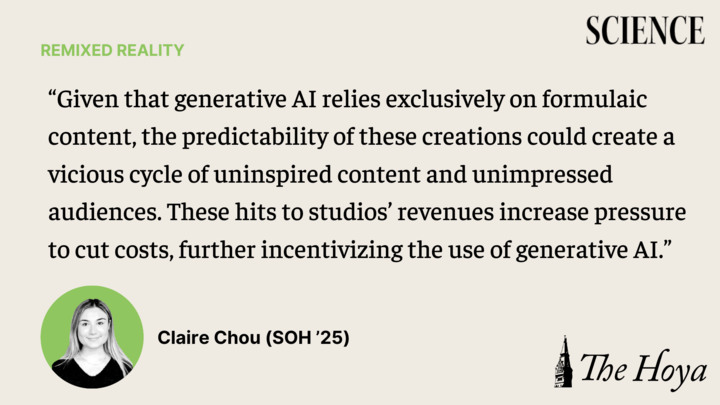
In this installation of her column "Gone Viral," Claire Chou (SOH '25) discusses legal and ethical concerns surrounding generative AI In the entertainment industry.
John Summit, a producer and DJ, performed at Electric Daisy Carnival (EDC) Orlando, one of the world’s largest electronic dance music (EDM) festivals, from Nov. 8 to 10. For the introduction of his set, Summit boldly remixed Kanye West’s iconic “I Love Kanye” track using artificial intelligence (AI) to generate a voice resembling West’s, but with lyrics referencing Summit’s life instead. While some fans described this intro as “epic,” critics noted that Summit did not consult or compensate Kanye for using his likeness. As this case highlights, generative AI in the entertainment industry is a new frontier with few legal regulations, making gray areas like this more likely.
Generative AI, which is technology that can create new content including text, images, videos and music, often sources information from databases without obtaining permission or giving credit and has become a polarizing development in recent years. AI can access online materials protected by copyright, like the “I Love Kanye” track, because of the fair use doctrine. This is a legal precedent that allows copyrighted works to be used as source material if the specific use meets certain criteria, including transforming the source into a different material and only using a reasonable portion of the original work relative to the new material.
Critics argue that generative AI is unfairly capitalizing on source material and violating proportionality of use because it isn’t creating anything intrinsically different or using a minimal amount of the copyrighted material. Instead, AI technologies are just reshaping a vast quantity of inputs. The intersection of copyright and AI is a “legal minefield,” according to The Economist’s “Schumpeter” column, and further legislation is needed to answer the question of whether creators will be able to prevent or profit from their work being sourced by AI.
The dilemma over copyright and AI came to a head last year with the Hollywood writers’ strike, during which the Writers Guild of America protested the use of AI in script writing, arguing that it has begun to replace or reduce the value of these writing jobs. After months of the strike, the group successfully reached an agreement with the Alliance of Motion Picture and Television Producers. For example, one of the agreement’s statutes prohibits studios from treating content generated by AI as source material to then be adapted by writers, a loophole that could limit writers’ compensation.
In addition to the legal and ethical concerns surrounding AI in the entertainment industry, award-winning television writer Anthony Sparks brings up a crucial point — while AI may offer a high volume of production by conjuring up scripts instantaneously, it bases its output on past work, potentially stifling creative growth and raising concerns about quality. The creative trajectory plateaus because the ideas are not truly new.
Jonathan Taplin, director emeritus at the Annenberg Innovation Lab at the University of Southern California, echoes this concern, arguing that “the biggest problem in the movies is too many formulas.” Given that generative AI relies exclusively on formulaic content, the predictability of these creations could create a vicious cycle of uninspired content and unimpressed audiences. These hits to studios’ revenues increase pressure to cut costs, further incentivizing the use of generative AI.
Even though AI in the entertainment industry poses risks related to fairness and quality, it also provides significant benefits for both producers and consumers. For example, streaming services like Netflix or Spotify can use AI to provide more tailored recommendations for their users. Companies can look at your past consumption and target their advertisements based on what they think you will enjoy. Additionally, AI can assist with every stage of the filmmaking process, including generating visual effects like complex computer-generated imagery (CGI) or accelerating the post-production editing process, thereby saving costs.
As debates continue, one thing is clear: AI is transforming the entertainment industry. But can the legal and creative worlds keep up?